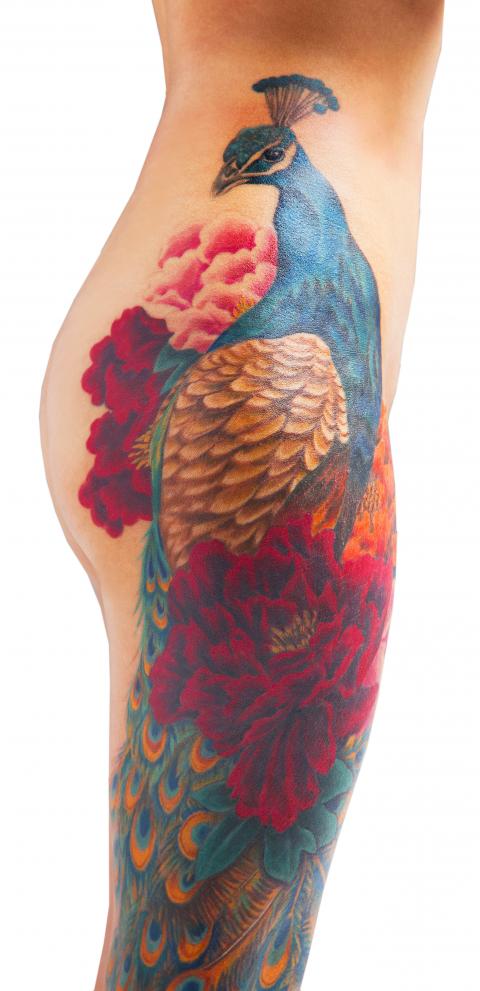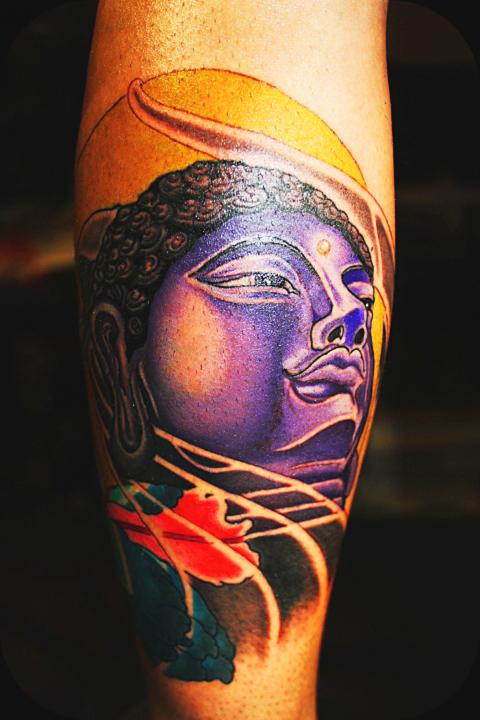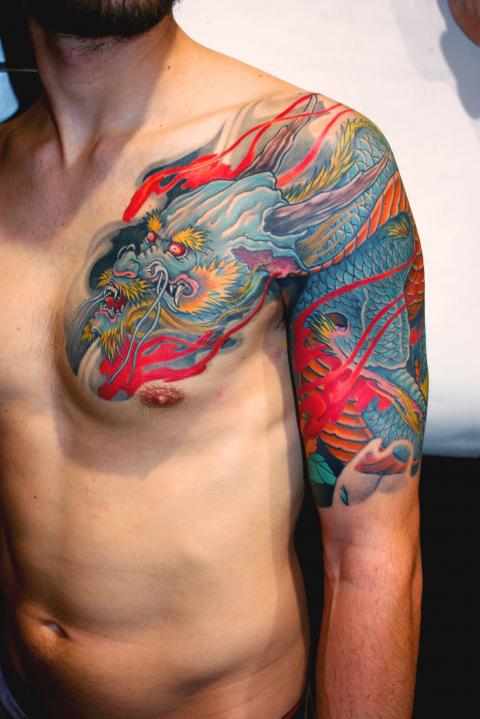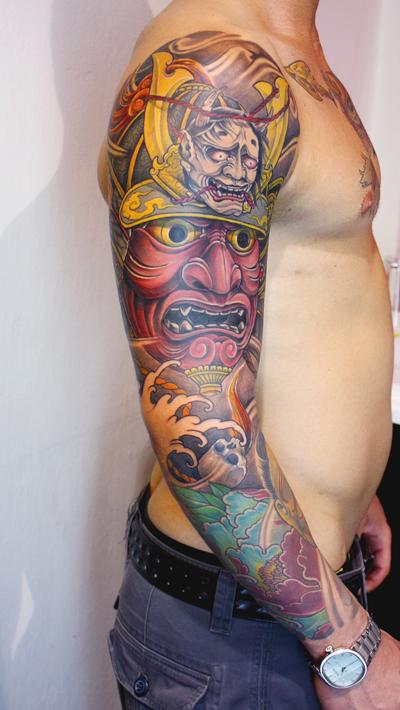Tattoos have a long history in Taiwan, from the ritual art of Aboriginal tribes to the gangster tattoos of the last few decades to the new school tattoo culture of areas like Taipei’s Ximending (西門町). Taipei even boasts a tattoo parlor at a live music venue, The Wall (這牆). This weekend, Greater Kaohsiung will host the fourth incarnation of the Taiwan Tattoo Convention, with artists from around the nation and all over the world showing off their inking skills during the three-day event.
Visitors to the convention will have the chance to see tattoos from both international and local artists, and to get a tattoo themselves — if they feel brave enough and can afford it. The daily schedule goes from noon to 9pm with performances throughout the day and contests between 5pm and 8pm each day focusing on the best of show in different categories including tribal/geometric, black and white, color, best full leg and best sleeve. Taiwan’s first ever Tattooed Bikini Babe competition will be held on Sunday at 3pm. A party will also be held Saturday from 9pm to 2am.
The fact that this is the convention’s fourth year suggests that tattoos are here to stay. As little as 10 years ago, a noticable tattoo would be met with stares or comments: I can’t count the number of times red-mouthed young toughs offered me betel nut after seeing my wings. In North America, getting a tattoo has practically become a rite of passage in university, but in Taiwan it has only recently become popular.

Photo Courtesy of Span Studio
“A tattoo itself is without original sin … Taiwanese’ views on tattoos are more open to this new culture,” said Wen Hsiang-yun (溫祥雲) of Yun Tattoo (藝雲紋身).
Striking the proper historical note, Wen added: “In the early Taiwanese Aboriginal multi-family status, [tattoos depicted] family class, coming-of-age rites, religious beliefs and symbols of glory.”
For those thinking of getting inked, a tattoo convention is an ideal place to shop around says Sun Shih-en (孫士恩) of Taipei’s Endless Studio (無盡紋身).

Photo Courtesy of Iresumisi Ryouga
“Every tattoo artist will show their best at the tattoo conventions,” Sun said, adding:“It’s also a chance to learn new things and exchange ideas with other tattoo artists.”
English teacher and tattoo fanatic Sheli Squire, who hails from Canada, has multiple tattoos — lizards, masks, musical notes and a striking montage of flowers from all the countries she has visited on her torso — inked by artists she connected with on her travels.
Squire says that a Salvador Dali quote written on her inner arm, “Intelligence without ambition is a bird without wings,” has been her “motivational saying for many years.”

Photo Courtesy of Kostas Tzikalagias
The reaction of her parents to her first tattoo, inked when she was 18, would probably be no different than how many parents would react.
“My mom freaked out and my dad wasn’t too impressed,” she said.
But Squire, taking the long view, says that people in Taiwan and Canada have become more accepting of tattoos.

Photo Courtesy of Kostas Tzikalagias
“Not every inked person is a lowlife vandal, gangster junkie. A lot of us are highly educated, well-adjusted members of society,” she said.
Tattoo artist Irezumisi Ryouga, visiting from RB Tattoo in Osaka, Japan, said that the prejudice against tattoos “is sad, but remains the fashion now.”
Ryouga said he enjoys attending tattoo conventions because of the sense of camaraderie he feels with other tattoo artists.
The stigma is felt worldwide, but things are improving. “Tattoos weren’t always so popular in Greece,” said tattoo artist Kostas Tzikalagias. “This has changed over the past few years. People are seeing tattoos with a different view. This helped the new generations to have different perspective and better opinions about tattoos.”
When asked what kind of motifs he’s drawn to, Tzikalagias said he likes imagery from Asian cultures.
“Skulls, demons, ghosts and everything from the Japanese mythology,” he said.
“Tattoo conventions are important because you can meet new people and see new places. You can meet and tattoo people from another country, discuss new ideas and techniques with tattoo artists from around the world.”
The Taiwan Tattoo Convention takes place from noon to 9pm Friday to Sunday at the Banana Wharf, 23 Penglai Rd, Greater Kaohsiung (高雄市蓬萊路23號). The venue is close to Sizihwan MRT Station Exit 2 (近捷運西子灣站2號出口). Admission is NT$350 per day or NT$900 for all three days. There is an after party from 9pm to 2am Saturday at the Banana Wharf; NT$499, free for tattoo artists at the convention. On the Net: www.tattoo.org.tw

Following the shock complete failure of all the recall votes against Chinese Nationalist Party (KMT) lawmakers on July 26, pan-blue supporters and the Chinese Communist Party (CCP) were giddy with victory. A notable exception was KMT Chairman Eric Chu (朱立倫), who knew better. At a press conference on July 29, he bowed deeply in gratitude to the voters and said the recalls were “not about which party won or lost, but were a great victory for the Taiwanese voters.” The entire recall process was a disaster for both the KMT and the Democratic Progressive Party (DPP). The only bright spot for

As last month dawned, the Democratic Progressive Party (DPP) was in a good position. The recall campaigns had strong momentum, polling showed many Chinese Nationalist Party (KMT) lawmakers at risk of recall and even the KMT was bracing for losing seats while facing a tsunami of voter fraud investigations. Polling pointed to some of the recalls being a lock for victory. Though in most districts the majority was against recalling their lawmaker, among voters “definitely” planning to vote, there were double-digit margins in favor of recall in at least five districts, with three districts near or above 20 percent in

From Godzilla’s fiery atomic breath to post-apocalyptic anime and harrowing depictions of radiation sickness, the influence of the nuclear bombings of Hiroshima and Nagasaki runs deep in Japanese popular culture. In the 80 years since the World War II attacks, stories of destruction and mutation have been fused with fears around natural disasters and, more recently, the Fukushima crisis. Classic manga and anime series Astro Boy is called “Mighty Atom” in Japanese, while city-leveling explosions loom large in other titles such as Akira, Neon Genesis Evangelion and Attack on Titan. “Living through tremendous pain” and overcoming trauma is a recurrent theme in Japan’s

The great number of islands that make up the Penghu archipelago make it a fascinating place to come back and explore again and again. On your next trip to Penghu, why not get off the beaten path and explore a lesser-traveled outlying island? Jibei Island (吉貝嶼) in Baisha Township (白沙鄉) is a popular destination for its long white sand beach and water activities. However, three other permanently inhabited islands in the township put a unique spin on the traditional Penghu charm, making them great destinations for the curious tourist: Yuanbeiyu (員貝嶼), Niaoyu (鳥嶼) and Dacangyu (大倉嶼). YUANBEIYU Citou Wharf (岐頭碼頭) connects the mainland